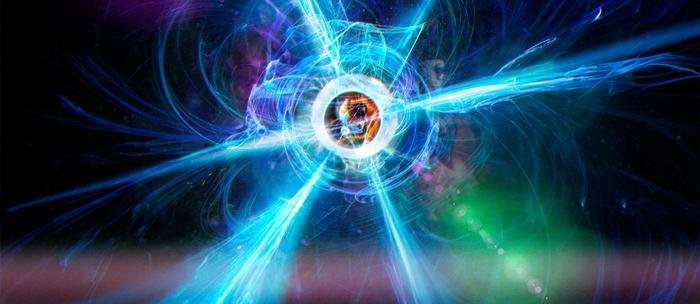A team of researchers studying the quantum realm say they have observed an otherworldly mirror universe through the eye of a decaying monopole that is eerily reminiscent of the mirror universe written about by author Lewis Carroll in his Alice’s Adventures in Wonderland.
Dubbed an ‘Alice ring’ in honor of Carroll’s mirror universe, these fleeting, quantum world events may help to unravel the mysteries of the quantum realm.
Magnetic Monopoles and the Doorway to the Mirror Universe
In quantum physics, monopoles are the proposed counterpart to dipoles, which have a positive and negative charge at opposing ends, just like a conventional magnet. In contrast, the monopole is only negatively or positively charged.
For decades, scientists have theorized how an actual magnetic monopole might decay, with the most common theory being that it would create a brief, fleeting ring-like structure that might open the door to an alternate “mirror” universe. As noted, the mirror universe revealed by these decaying rings reminded theorists of the mirror universe in Lewis Carrol’s Alice’s Adventures in Wonderland, where everything is the opposite of the real world.
Such theoretical Alice rings have remained particularly elusive for decades. But now, a team of researchers who have been studying the phenomenon for years say they have spotted these structures in nature for the first time ever. And as they suspected, ‘Alice rings’ may indeed be a portal to what they describe as an “otherworldly” mirror universe.
Experiments Reveal Alice Rings in Nature For the First Time
The hunt for a real-world Alice ring involved a years-long collaboration between Professor Mikko Möttönen of Aalto University and Professor David Hall from Amherst College. In fact, their first discovery on the road to Carroll’s mirror universe took place in 2014, when the duo successfully proved the existence of an analog of a quantum monopole. In 2015, they actually isolated a quantum monopole, and then in 2017 actually observed one decaying into the other. Still, it wasn’t until their latest research that they witnessed the appearance of the doorway to the mirror universe known as the elusive Alice ring.
“This was the first time our collaboration was able to create Alice rings in nature, which was a monumental achievement,” Möttönen said.
According to the press release announcing this once-in-a-career feat, the research team, which was aided by Ph.D. candidate Alina Blinova, “manipulated a gas of rubidium atoms prepared in a nonmagnetic state near absolute zero temperature.” Then, operating under these extreme conditions, the researchers were “able to create a monopole by steering a zero point of a three-dimensional magnetic field into the quantum gas.” As previously theorized, the result was a perfectly formed Alice ring.
Notably, the researchers point out that ‘Alice rings’ only last for a few milliseconds, as they are extremely fragile. This means that when a magnetic monopole is exposed to the slightest external force, it immediately decays into an Alice ring.
“Think of the monopole as an egg teetering at the top of a hill,” Möttönen said. “The slightest perturbations can send it crashing down. In the same way, monopoles are subject to noise that triggers their decay into Alice rings.”
Creation of Alice Ring Reveals Window into Otherworldly Mirror Universe
Perhaps even more astonishing, and as the longtime collaborators had hoped, their ‘Alice ring’ seemed to offer a glimpse into a mirror universe just like Carroll’s.
“From a distance, the Alice ring just looks like a monopole, but the world takes a different shape when peering through the centre of the ring,” Hall said.
“It is from this perspective that everything seems to be mirrored, as if the ring were a gateway into a world of antimatter instead of matter,” Möttönen added.
Published in the journal Nature Communications, the researchers say that the verified observation of an Alice ring in the real world could one day lead to a better understanding of quantum physics. However, there is still no indication whether or not it will lead to attending a tea party with a mad hatter.
Christopher Plain is a Science Fiction and Fantasy novelist and Head Science Writer at The Debrief. Follow and connect with him on X, learn about his books at plainfiction.com, or email him directly at christopher@thedebrief.org.

